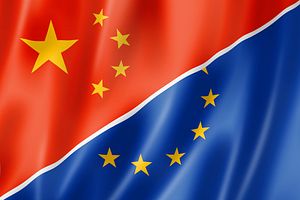If Edward Snowden’s revelations about the United States’ global surveillance activities taught U.S. allies anything, it’s that on the world stage, even your closest friends can’t be trusted. The United States has recently been feeling the sting in a similar way – not because of espionage, but because its allies are hemorrhaging valuable defense technology to China. Recent reports suggest that the United States’ European allies and Israel have exported or had made plans to export sensitive defense technology to China.
According to Reuters, “If the People’s Liberation Army went to war tomorrow, it would field an arsenal bristling with hardware from some of America’s closest allies: Germany, France and Britain.” Reuters substantiates this claim – Chinese advanced surface warships largely field French and German diesel engine designs under the hood; Chinese destroyers field French sonar technology, as do anti-submarine warfare (ASW) helicopters and surface-to-air missiles; British propulsion technology and airborne early warning radars can be found in several PLA fighters, bombers, and anti-ship aircraft. Additionally, “some of China’s best attack and transport helicopters rely on designs from Eurocopter, a subsidiary of pan-European aerospace and defense giant EADS.”
Israeli sources report that a top Israeli defense official was forced to resign recently after the United States “expressed fury at Israel’s decision to sell military equipment to China.” The incident hearkens back to the Israel-China Phalcon airborne radar system deal which was cancelled at the United States’ insistence – the cancellation of that deal resulted in a costly settlement for Israel which had to pay China $350 million in damages for backing out of the contract at the “last minute” under U.S. pressure. The more recent indent involved the sale of Ricor miniature refrigeration systems, which are “used for missiles and in electro-optic equipment.”
As China grows economically and militarily, it has a tendency to go everywhere and do business with everyone – including important U.S. allies. Ultimately, the trend of U.S. allies exporting sensitive military and dual-use technology to China will remain a major threat to U.S. national security in the long-term and has no immediate and easy solution. The United States won’t be able to exert the source of leverage it does with Israel should other partners export sensitive technology to China.
As for China, currently the country with the second largest defense budget after the United States (although still quite far behind in absolute terms), European technology in particular is appealing – with strategic importance for the PLA. For example, according to data from the Stockholm International Peace Research Institute (SIPRI), China’s purchases of submarine engine technology from the German firm MTU Friedrichschafen are strategically vital to the PLA’s submarine modernization effort (the Reuters report explores the European contribution to China’s submarine program in some detail). China’s relationship with European suppliers shouldn’t be overstated; while the relationship is certainly beneficial China, Russia is still by and far China’s top source of weapons technology.
Times have certainly changed for Europe, which still maintains an official arms embargo against China following the 1989 Tiananmen Square incident. While the United States continues to regulate the exposure of its indigenously developed defense technology to Chinese eyes, it doesn’t have the luxury of counting on its allies to do the same – particularly with regards to dual-use technology.
The gaping loophole in the European embargo that permits China to still profit strategically from European know-how and technology is the fact that it doesn’t cover dual use goods – technology that could plausibly have non-military applications, but also could be used for military ends. E.U. spokesperson Michael Mann made sure to point this out against recent scrutiny of European trade with China; the embargo ‘”does not refer to dual use goods.’ It is up to individual member states to exercise control over such goods, Mann said.”
However much the United States might dislike the current state of affairs, there is little that can be done about China’s procurement of technology from key U.S. allies. Europe and Israel aren’t the only sources of concern for Washington; an investigation by Gordon Lubold of Foreign Policy earlier this year suggests a more insidious problem for the United States and its allies, exemplified by the case of South Korea, which could be lifting U.S. technology wholesale for its own defense industry. We know that the issue of defense commerce is a hot topic between Israel and the United States, given the very public attempts by the United States to intervene in Israeli dealmaking. The issue is burgeoning in the U.S.-E.U. agenda as well, with no real solution favorable to U.S. interests in sight.
































